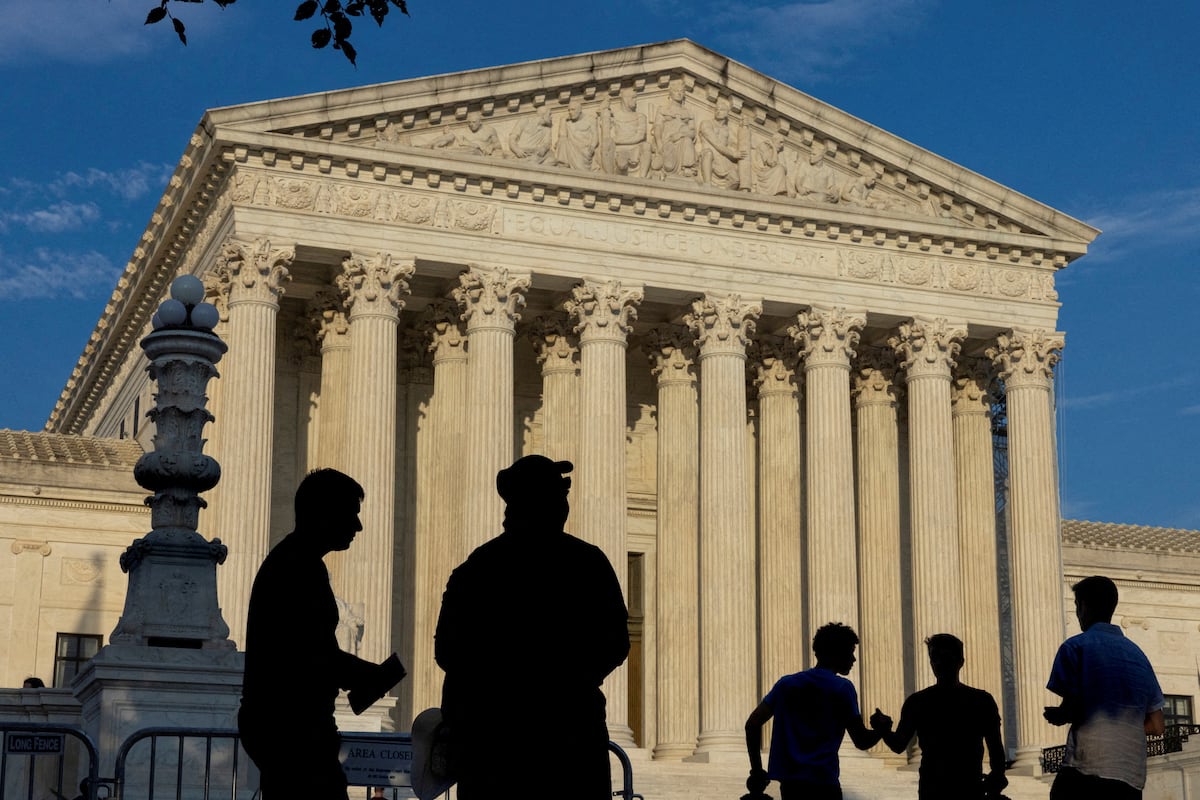Richard Glossip has had a date with his execution eight times. In three of them, he even went through the ritual of the last meal on death row. This week, he has a new chance to save his life. His case will be one of the first analyzed by the United States Supreme Court in its new judicial course, which begins this Monday with two lawsuits of a technical and procedural nature. Over the next few months, the judges who have been carrying out a conservative revolution for three years will analyze cases related to firearms, access to pornography, the environment, trans rights and one whose mere admission says a lot about the orientation of the Court: discrimination against heterosexuals.
New dishes will be added to the menu, some very tasty. The judges may end up deciding on hypothetical challenges to the result of the November 5 elections and on the criminal cases being pursued against one of the candidates: Donald Trump.
Trump already starred in the last judicial course. The judges unanimously refused to disqualify him for insurrection from running for election. In another ruling, they reduced the force of the crime of obstruction of an official procedure for which many of those accused of the assault on the Capitol were prosecuted and for which the former president himself is accused. But, above all, in the most significant ruling, the conservative majority granted broad immunity to Trump for his acts while in office in the case in which he is accused of trying to alter the result of the 2020 elections.
In any case, they referred to the lower courts the analysis of whether the acts of which he is accused were official or private and whether that doctrine applies to them. Special prosecutor Jack Smith has managed to get another grand jury to indict him again for the same crimes, purging the acts that he considers covered by immunity. It cannot be ruled out that, in this case and others, the Supreme Court will have to rule again. The legality of Smith’s own appointment, on which there are conflicting decisions, may also reach the high court.
If Trump also wins the elections, there will be an unprecedented situation – yet another – in which the judges, three of them appointed by the former president, will have to rule, for example, on the validity of his New York conviction or on the other accusations while occupying the White House. To make matters worse, the winner of the presidential election may end up depending on the judges’ decisions in the event of a close result and challenges. In 2020, the Supreme Court justices buried their crusade to reverse the results, but Trump’s team has been preparing its arsenal for some time for the scenario of a hypothetical legal battle.
Double firearms
Waiting to see if these cases arrive, the Supreme Court already has plenty of work on the table. Firearms return twice. The judges will have to decide whether the Joe Biden Government’s rule that imposes restrictions on kits of parts and templates for homemade weapons, known as ghost weapons, is constitutional, which is very difficult to trace and whose use has increased significantly. They must also rule on whether gun manufacturers have immunity from a lawsuit by the Mexican government that holds them responsible for knowingly maintaining a distribution system that leads to illegal arms trafficking to Mexican drug cartels.
The Court will analyze the constitutionality of the Tennessee law restricting puberty blockers and hormone therapy for transgender minors that the Biden Administration believes violates the equality clause of the 14th Amendment to the Constitution. Many states have passed similar rules, so the decision will have a wide impact. The Supreme Court will also consider an appeal by Marlean Ames, a heterosexual woman, who claims that she lost her job to a homosexual man and that she had not been granted a promotion in favor of a homosexual woman.
In environmental matters, a case on polluting discharges and another on the ability of the Administration to grant licenses to nuclear waste storage facilities are at stake. In addition, the judges will rule on the validity of the health authorities’ veto on certain flavored electronic cigarettes.
Another case that will attract attention will examine the validity of the new Texas law that requires adults to register and provide personal information, including a copy of an identification document, to access sexually explicit websites and requires displaying warnings. that porn is potentially addictive.
It will also analyze the appeals of two people sentenced to death. One alleges that evidence that favored him was hidden and another challenges that DNA evidence that he believes would favor him has been rejected. There is also a notable case about police violence.
Technology giants Facebook and Nvidia are scheduled to defend themselves against class action lawsuits that accuse them of hiding or falsifying information in their annual reports and issue brochures.
This will be the fourth course of the thunderous revolution undertaken by a Supreme Court in which six of its judges are conservative, including the three appointed by Trump, and only three are progressive. The Supreme Court gave its first big knock in 2022, with controversial rulings that repealed the federal right to abortion, undermined the fight against climate change, expanded the right to carry firearms, gave a greater role to religion in schools, questioned the mandatory vaccination of workers against covid and reduced the power of federal agencies. In 2023, after several rulings that seemed to show a more focused position, the judges closed the course with a blow to positive discrimination for access to university, the license to discriminate against homosexual couples under freedom of expression and the annulment of the partial remission of student loans.
Last year, the justices upheld by eight votes to one the ban on the use of firearms by domestic abusers, admitting that the Second Amendment has its limits, but they overturned the ban on devices that effectively turn rifles into machine guns, in this case with the vote of the six conservative judges. They also allowed emergency abortions in cases of danger to the mother’s life and, unanimously, maintained access to the abortion pill. They endorsed the right of social networks to moderate their content, but referred the case to lower courts, which leaves the final solution somewhat in limbo. They reduced the power of regulatory agencies in environmental and stock market matters and endorsed fines to prevent the homeless from settling in the cities. However, it was the rulings that favored Trump that marked the judicial year. Maybe history will repeat itself.








